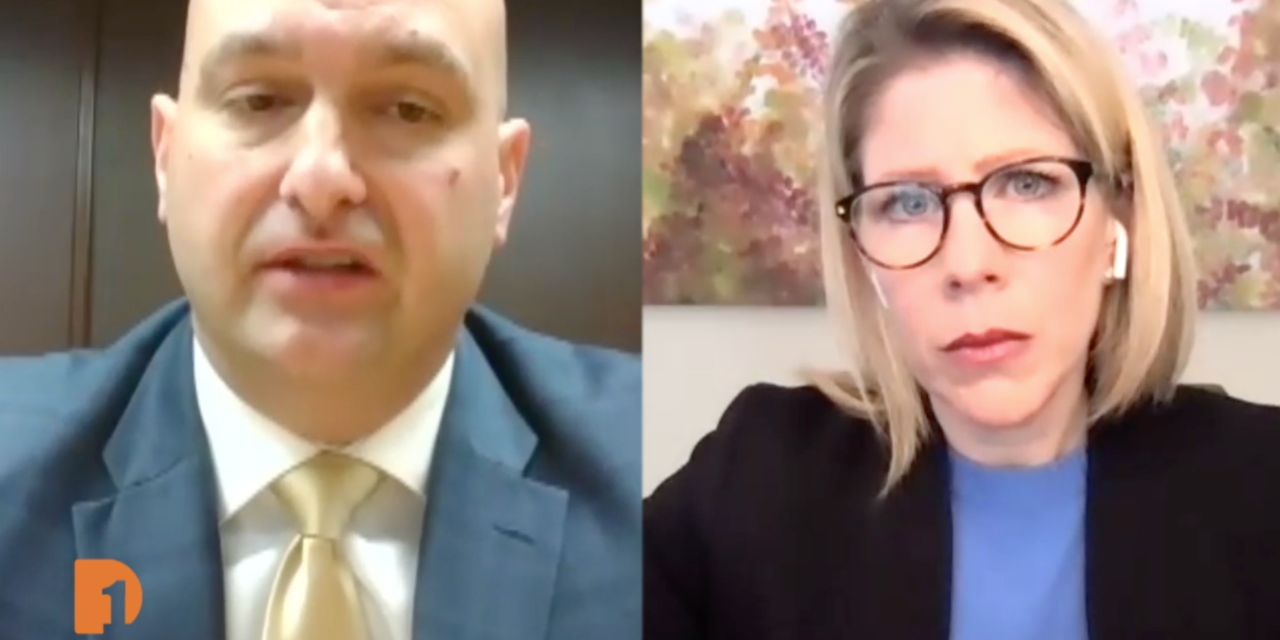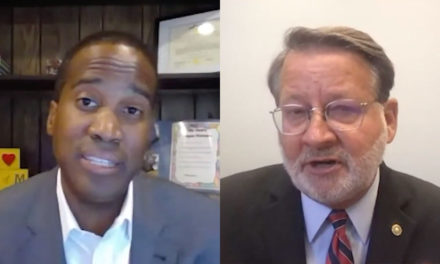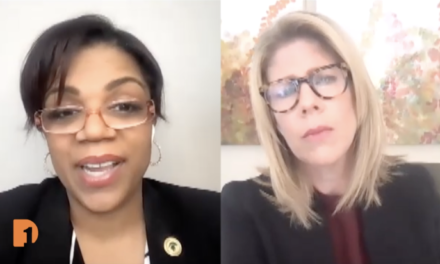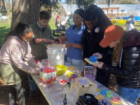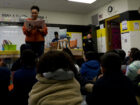DPSCD Superintendent, Dr. Nikolai Vitti, wrote a letter to Governor Whitmer, urging the governor to let Michigan schools to resume school sports.
Dr. Vitti, who positions himself as a critical colleague of the governor, spoke with One Detroit’s Christy McDonald:
“We need concrete data to know why we should open schools, why we should close schools, why we should stop sports, why we should continue sports. At the end of the day, if schools are open, sports should be played. That my opinion as superintendent. And I feel that’s what the majority of our coaches and student athletes and families are saying.”
He also talks with Christy about the timeline for in-person learning and dealing with learning loss.
Read full transcript
Christy McDonald All right, let’s go ahead and get started. So this week, you sent a letter to Governor Whitmer asking for kids to play winter contact sports, saying that there hasn’t really been there’s been contradictory messages between policy and what you’re seeing. What is your argument that these kids should be playing right now, that they are they could not be the cause of community spread.
Dr. Nikolai Vitti, DPSCD Well, there are several. One, I think we went through fall sports. Obviously, it’s hard to argue that there’s anything more contact driven this from a sports perspective than football. And in order to restart the latter part of the playoffs, the Health Department at the state level and the governor required students to be tested when they tested, 99.6% tested negative
And that was at the height of the, you know, the recent surge in positive COVID rates in the city, in the state. So that number clearly shows us that it’s not student athletes that are spreaders of COVID. That’s one issue. The second issue is we played football throughout the fall with little incidents–hiccups, challenges, but we’re all dealing with positive cases from businesses to schools. The third issue is 80% of states throughout the country are playing high school basketball in winter sports. So why aren’t we? The bordering states of Michigan are playing? Why aren’t we? They’ve been playing for a while with very few incidents–again, hiccups, challenges, but not, you know, the major health concerns that seem to be used for student athletes.
And, you know, at the end of the day, these are consenting families that are measuring the risk of playing. They want to play. And factually they’re leaving the state to play in Ohio, in other states, and that just doesn’t make sense. Lastly, I agree with the governor that we should be working to reopen our schools by March 1st. But it sends a contradictory message to tell students ‘go back, it’s safe to go to school’ where they’re, depending on the high school, they’re interacting possibly with dozens, one hundred students in hallways by lockers, sitting in classrooms for a long period of time. We’re telling our young people they can go to school, they can go to the movies now, they can go to eat. They can even practice basketball, but they can’t compete. I think it’s contradictory. I don’t think it helps with the reopening the economy, reopening our schools. And lastly, I know the governor is better than this. I feel I believe in our leadership. I believe in our judgment.
And at the end of the day, she just needs to explain why. And she hasn’t done that. And we all have higher expectations for her. I believe in her. I think she will step up. And we’ve all, as leaders felt difficult, have been in difficult situations. We’ve all been in situations where people disagree with us. But what strong leadership represents is telling people why you feel the way you do, giving data, giving concrete examples why you should support the opposite opinion and then you move forward. There hasn’t been transparency on this issue and that needs to change. And I’m worried that the governor’s staff is going to lose support among her supporters if she doesn’t become more transparent about phases of reopening and closing. We need concrete data. We need concrete concrete data to know why we should open schools, why we should close schools, why we should stop sports, why we should continue sports. At the end of the day, if schools are open, sports should be played. That’s my opinion as superintendent. And I feel that’s what the majority of our coaches and student athletes and families are saying.
Christy McDonald It’s also a mental health issue that there is a place for kids to go and have the motivation to be able to keep showing up to school knowing that they can play sports as well.
Dr. Nikolai Vitti, DPSCD Yeah, well said. I agree. As a lot of our student athletes, their identity is based on being an athlete. That’s where they get their motivation, their self-esteem, their perseverance. And we’ve taken that away. Completely understood why that happened at the height of the pandemic, even when positive rates increased. I believe that in school, in-person learning should have been suspended and sports should have been suspended. Fine with that. But now our rates are lower than even bordering states. But yet we’re still not playing. And I think what’s most hurtful right now is that there’s obviously this big, large, massive social media request for the governor to give explanation of why we’re in this place in Michigan. And there’s been a radio silence. And that’s just that’s not the qualities that I look up to the governor for. And I know she’ll do better.
Christy McDonald Let’s go ahead. So we’re at the week of January 25th. What is the timeline for us to have in-person learning? What are the numbers that you’re looking at?
Dr. Nikolai Vitti, DPSCD So, as you know, we were one of the first large urban school districts to offer in-person learning. We went through a lot of heat for doing that last summer. And in the fall, we ran in-person learning from, you know, summer right before Thanksgiving with very few incidents. We only had one outbreak prior to November when the rates were getting out of control. But we suspended in-person learning before the governor called to do that because the rates in the city were at six percent and rising. And we said we would open schools, that the positive infection rate was below five percent. And if it was above that, we would consider suspension of that. So right now, the city rate is at about five percent.
That’s a seven day average. And the daily averages lately been below five percent. So we’re hopeful that we’ll open all of our schools as learning centers next week so that all children can come to school and log in, eat breakfast, eat lunch, be supported by para-educators, administrators. And then if the rate goes well below five percent, let’s say 3 and steady, then we’re looking to open up in-person learning by the first week after our mid-winter break, which is February 22nd.
Christy McDonald COVID has shown that each district has had to do its own thing to serve the population of the students that are in their schools.
What would you say, though, is the biggest challenge unique to Detroit public schools that no other district is facing in Michigan?
Dr. Nikolai Vitti, DPSCD Well, you know, it has been said before me, but I often say when the rest of the nation has a cold, we have pneumonia. And you know that that’s what we’re seeing with COVID generally with the disproportionate death rates that happened at the height of the pandemic. Daily when we run our schools, we have higher chronic absenteeism rates. We have, on average, a higher failure rate–challenges with graduation rates. So everything that we’re challenged with normally is exacerbated in this pandemic.
Whatever we’re dealing with, we’re dealing with at a higher level in this pandemic. But specifically to COVID, what I think is different in this city is how fearful families are about COVID and how afraid they are to send their children back to school. So when we initially did our surveys at the beginning of the school year, about 20-25% percent of families were comfortable with in-person learning. That was much lower than we saw throughout Michigan and throughout the country, rather consistent among the large urban school districts with still lower. Now we’re doing a survey for the third quarter, which starts the second semester in February, and we’ve doubled with the families demanding in-person learning, but it’s only at about 50 percent. So 50 percent is much lower than you’re seeing in Novi or other places throughout Michigan. So we’re always going to be a little behind. And I think that’s why it’s important for the governor and the legislature to be flexible about what it does next fall. I think it’s going to be important to continue to offer online learning and fund it. And and I’m going to be encouraging President Biden, Governor Whitmer and others to support a national ad campaign to talk about safety of in-person learning, even as we try to get to the other end of this pandemic. Because I think rightfully we talked about social distancing, wearing a mask, sheltering in place, but that has really resonated with our families because of the disproportionate impact that COVID has had on the Detroit community. And so it’s going to take extra work, more communication, more awareness to bring about larger numbers of students coming back to school. And the vaccine is not the silver bullet. You know, 60 to 70% of our families and employees say that the vaccine is not going to change their mind about in-person teaching or in-person learning.
So we’ve got to get over the idea that the vaccine is going to be the reason why Detroiters come back to schools.
Christy McDonald One concern that I’ve heard from parents, teachers across the spectrum, it doesn’t matter where you are and what district is learning loss. How concerned are you? What kind of what kind of measures do you have in place in the district to to see what kind of learning loss we might be dealing with? And do you have possible solutions to either make up what the kids have lost or kind of looking down the road and how we’re going to deal with this?
Dr. Nikolai Vitti, DPSCD We’re certainly seeing learning loss. Anecdotally, I would say our data is skewed right now. We do assessment that the key eight level in literacy and math to look at grade level proficiency or performance, but the data is skewed because it’s missing about 2,000 students that did not enroll in DPSCD, and we’re dealing with chronic absenteeism, so the students that would normally test in school and participate in school are not consistently engaged with online learning.
So actually, when you look at our K-8 numbers, they’re actually higher from a performance perspective than last year. But that data is, like I said, skewed. The other issue is our early learners, our K through 12 students were obviously helped by their families when they took their assessments at home.
So that that’s inflating the performance numbers. Understandable. Children get frustrated with tests and their parents want to help. So that also led to the skewing of the data. At the high school level with the PSAT and the SAT, at least at the baseline fall to fall last fall before the pandemic. And now we’re seeing a large increase of students that are behind in the PSAT in the SAT. So our plan moving forward is we’re going to dramatically increase summer school access. We’re looking to possibly have every school open in the summer for voluntary summer school, not mandatory. We’re hoping that our employees will be willing to participate and be paid well, offer online and in person. We also envision offering online and in-person support over the breaks next year. So spring break, winter break, our midwinter break still continuing with our employees, working with our students or having partners come in as well.
We’re adding more partners for literacy already. And we want more partners for math to work with students in small groups during the school day and after school.
So those are some of the things that we’re looking at as far as trying to make up for that learning gap.
Christy McDonald In the last two minutes that I have you, Dr. Vitti, there have been recent reports from around the country about the toll that online school is taking on kids mental health. Have you been able to up the number of counselors within the district? Are teachers able to help assess if the students are struggling?
Dr. Nikolai Vitti, DPSCD Well, we were fortunate before the pandemic hit when the board and I created a new strategic plan and shifted our budget to drive that plan, we made a commitment to fund guidance counselors at every school in the district and then our our schools with larger student populations, even to have more guidance counselors in our high schools have college advisors, transition advisors. So, you know, we’ve done a good job even before the pandemic for additional counselor support.
And we’ve moved away from contracted services with guidance counselors and social workers. So during online learning, we actually have a log that’s required to be maintained by our guidance counselors, social workers, our aides, even our our para-educators to call home and check in on parents.
I think that’s why our home visit process has been so successful, is that even on the Martin Luther King holiday, we actually visited homes and the campaign was, are you OK? How can we help you? How can how can we help you manage through this? So we’ve we’ve created a mental health hotline that parents and students and even employees can call that that’s managed by our guidance counselors and our social workers. There’s no question that everyone, I think even adults are suffering from more social isolation because of this pandemic.
But it’s certainly impacting our children. And I think that’s why getting children back into schools is so important when families are ready. But I am confident that we are able to reach out when there’s issue. We’re also conducting a survey that students take in answering questions. It’s a survey that was developed by the University of Michigan that when students answer the questions based on how they respond, a red flag goes up. And then when that red flag goes up, it’s registered in our in our student information system. And it signals for guidance counselor, social worker, even an administrator to call that home to just problem solve and check in with the student beyond just learning online.
Christy McDonald All right. Well, that’s all the time we have. Dr. Vitti, as always, it’s good to see you. Take care of yourself, OK?
Dr. Nikolai Vitti, DPSCD You, too. Thank you.

